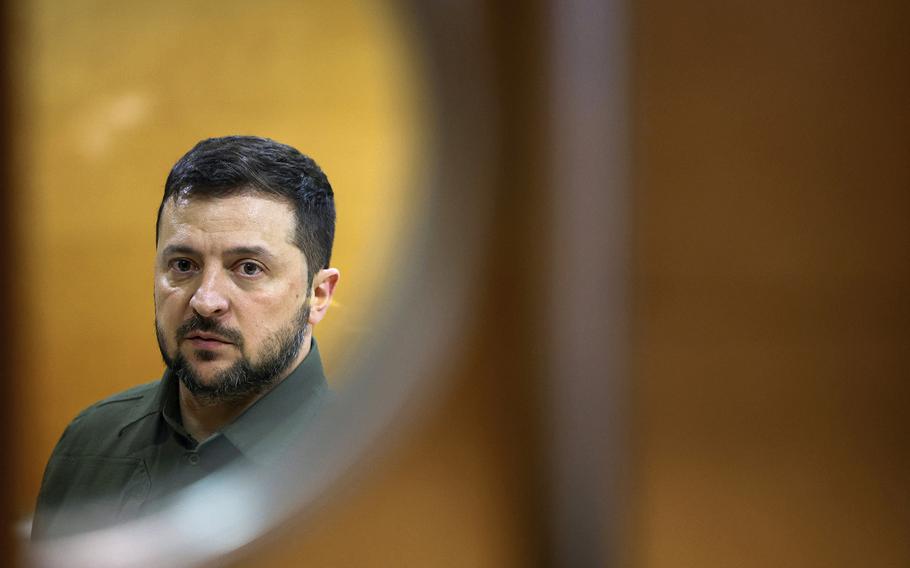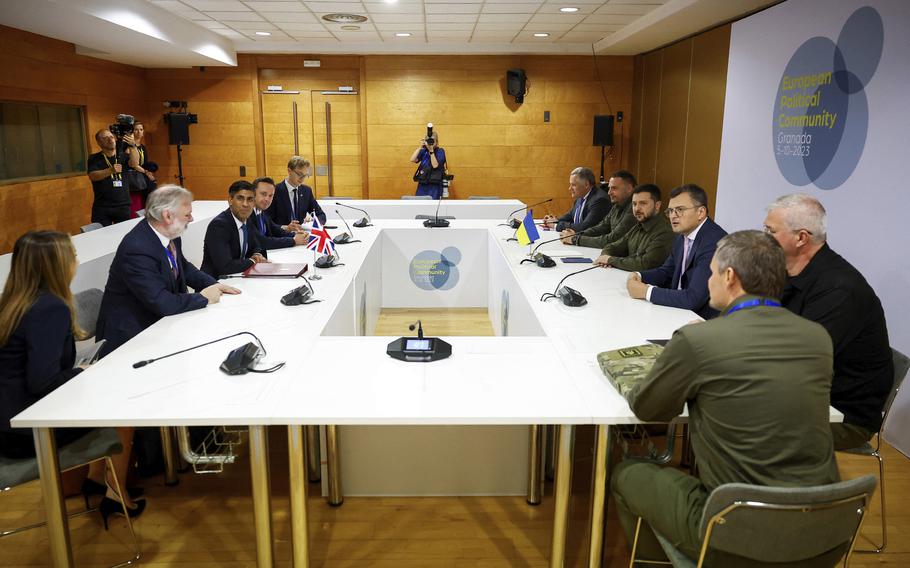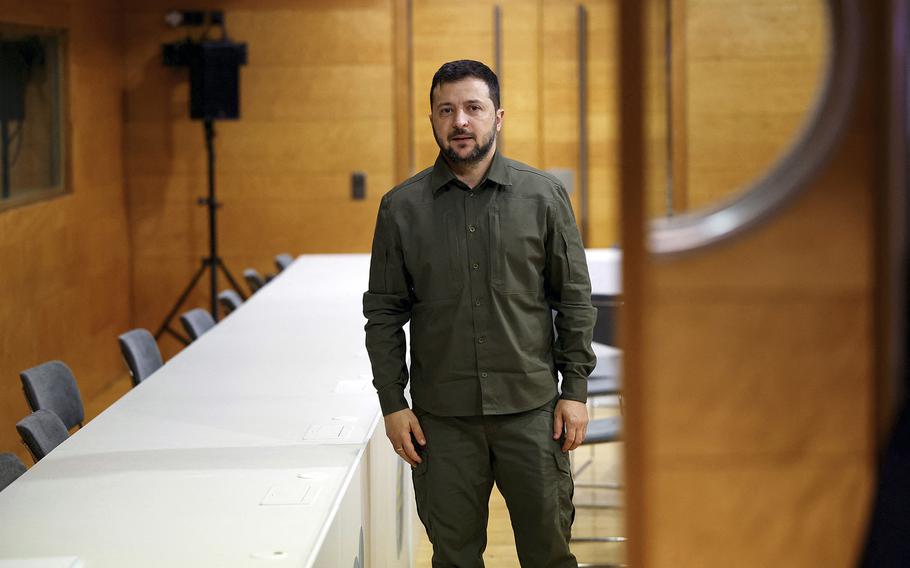Europe
AnalysisAs US support for Ukraine wobbles, EU takes up membership question
The Washington Post October 6, 2023

Ukraine's President Volodymyr Zelenskyy looks on before meeting British Prime Minister Rishi Sunak during the European Political Community summit in Granada, Spain, on Thursday Oct. 5, 2023. (Juan Medina, Pool /Reuters)
GRANADA, Spain - In a week when financial support from Ukraine’s largest backer, the United States, suddenly looks shaky, European Union leaders gathered in southern Spain on Thursday to talk about what would need to happen to extend Ukraine the support of E.U. membership.
There is broad consensus among E.U. leaders that growing their bloc is necessary to counter Russia and its allies, which is good news for Kyiv and other capitals that want to be part of the club. Yet even in the best of times expanding the E.U. to include Ukraine and others would be a costly, complex and politically perilous process. Trying to move that forward in the midst of war multiplies the difficulties.
There are immediate challenges. An E.U. country, Slovakia, just backed the party of a populist who supports Russia. Ukraine and its western neighbors have been arguing over the grain trade. And the slow progress of Ukraine on the battlefield has raised fear of a frozen conflict and increasing war weariness in Europe.
In a sign of how the needs of Kyiv may be slipping on the E.U. agenda, the summit this week has been partly overshadowed by the conflict between Azerbaijan and Armenia, tensions between Serbia and Kosovo and disagreement over how to address migration.
On the eve of talks on Thursday, President Biden convened a call with key allies to reassure them the United States still supports Ukraine, despite Congress passing a government funding bill last week that did not include funding for the embattled country.
In Granada, Ukrainian President Volodymyr Zelensky acknowledged “the events in America, the political storm that is gathering momentum.” Yet he said, “I am confident in America. These are strong people, strong society, strong institutions, strong energy of democracy.” He encouraged E.U. leaders to push ahead and embrace their “independent power potential” while working “to defend our values and our common space of freedom with the U.S.”
European officials and diplomats have in recent weeks shrugged off questions about American support for Ukraine, insisting that Republican leaders will, in time, accept their theory that a victory for Ukraine is core to U.S. interests, in part because of the message it sends Taiwan on territorial integrity.
That insistence continued in the public messaging on Thursday. European Commission President Ursula von der Leyen said she was “very confident” of American support for Ukraine. “What the United States is working on is the timing,” she said as she entered the venue. Estonian Prime Minister Kaja Kallas said, “I think political support is high, despite the developments we see in different countries.”
But with U.S. politics in shambles after the ouster of Kevin McCarthy (R-Calif.) as House speaker, it has become harder for Europe to ignore the possibility of a shift in the U.S. stance and what it may mean for Ukrainian prospects on the battlefield and beyond.
Funding delays would “put at risk the Ukrainian victory that should ensure sustainable and long-lasting peace on the European continent that is in the interest of the United States,” said Victoria Voytsitska, director of advocacy at the International Center for Ukrainian Victory and a former member of the Ukrainian parliament.

Ukraine's President Volodymyr Zelenskyy, center right, meets with British Prime Minister Rishi Sunak, center left, during the European Political Community summit in Granada, Spain, on Thursday Oct. 5, 2023. (Juan Medina, Pool /Reuters)
E.U. foreign ministers traveled to Kyiv on Monday in a symbolic show of support, with foreign policy chief Josep Borrell announcing a proposal for more than $5 billion in additional funding for Ukraine. But that money still needs to be approved, and getting unanimity for further aid packages may not happen easily. Populist Robert Fico, whose party got the most votes in the recent Slovakian election, campaigned on ending military support for Ukraine. Hungary has already been blocking military aid.
Russian President Vladimir Putin, as always, seemed to relish in the Western divisions. Speaking on Thursday in the Black Sea resort city of Sochi, he noted that Washington faced “certain problems with their budget.” The Biden administration might simply “print money” to resolve it, Putin ventured. But he also warned, “as soon as they stop” military assistance to Ukraine, “snap and it all goes down.”
Kremlin spokesman Dmitry Peskov predicted Thursday that the United States would remain involved in the conflict, but division would deepen. “Our forecasts indicate that weariness with this conflict, weariness with the absolutely absurd sponsorship of the Kyiv regime will grow in various countries, among them the United States,” he said.
If the issue of aid for Ukraine has made for strained discussions, then the issue of E.U. membership is all the more fraught. In meetings on Friday, E.U. leaders will consider how to bring more countries closer, including a potential expansion of the bloc from 27 to over 30 members, potentially drawing in Ukraine, Moldova and Georgia, as well as several countries in the western Balkans.
Joining the E.U. takes years. The political and legal system of a prospective member is studied, assessed and then slowly brought into compliance with a rather lofty rule book in Brussels. A raft of countries, including Serbia, Montenegro, North Macedonia, Albania and Bosnia, have been in membership talks for years. Turkey, which applied to join in 1987, remains a candidate, technically, despite the fact that its prospects look, at best, slim. Over the past year, Ukraine has worked closely with E.U. officials to undertake reforms that would start to bring it in line with what is required. The E.U. will decide whether to open accession talks with Kyiv in December.
The challenge in Brussels will be equally complex. The prospect of bringing in Ukraine and other additional members has renewed questions about how the bloc runs with 27 members, as well as how it would run with Ukraine and others in the fold. “It is vital that we contemplate the future dynamics of our Union, our policies and decision-making, among others, to ensure the EU’s continued success,” Charles Michel, president of the European Council, wrote in a letter to leaders ahead of the informal summit on Friday.

Ukraine's President Volodymyr Zelenskyy looks on before meeting British Prime Minister Rishi Sunak during the European Political Community summit in Granada, Spain, on Thursday Oct. 5, 2023. (Juan Medina, Pool /Reuters)
If Ukraine joined, it would become the fifth-most-populous E.U. country and its poorest per capita by a significant margin, drawing subsidies away from other members. A recent disagreement between Ukraine and its E.U. neighbors, including Poland, foreshadowed the challenge of one day bringing a major grain exporter into the single market.
Some also wonder how the E.U. can welcome new members when it is struggling, very publicly, with current members like Hungary and Poland. In a much larger bloc, with more members and an even broader set of interests, what mechanisms will be available to deal with outliers? “To me, it is not only a question of what to do about the people that want to come in,” said Camino Mortera Martinez, who leads the Brussels office of the Center for European Reform. “It is also what to do about the people who are in and not necessarily complying with rules.”
Then there is the issue of timing. Michel, the European Council president, has said he wants Europe to be ready for the new members by 2030. Some doubt that is possible. “The target date of 2030 is not realistic,” said Teona Lavrelashvili, a policy analyst at the European Policy Center, a think tank focused on European integration.
“It is political commitment,” Lavrelashvili said, adding, “I think it is important to have the political commitment, but we should be careful not to overpromise” and “we have to use this time to see what is feasible and what is not feasible.”
Dixon reported from in Riga, Latvia. David L. Stern in Kyiv contributed to this report.